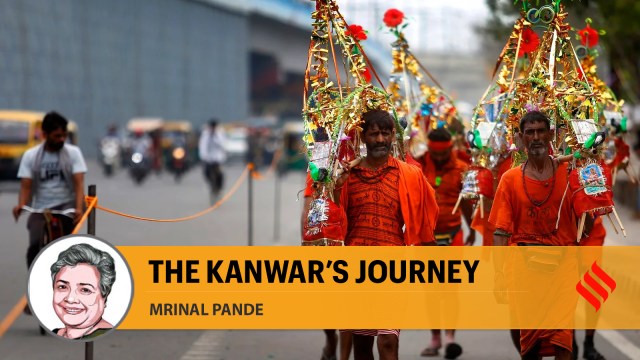
Muzaffarnagar is said to have been founded in 1633 by Syed Muzaffar Khan, a chieftain in the service of Mughal emperor Shah Jahan. Located in the fertile Doab region, fed jointly by the Ganga and Yamuna rivers, the city in western Uttar Pradesh is fast becoming a centre of sabre-rattling. The polarising ways of the state government impart an extra edge to the communal tension during the annual march of kanwariyas.
In the past, much blood has been shed in Muzaffarnagar over zar, joru and zameen (gold, women and land). It has also seen communal violence. The city, ironically, has also been home to writers and artistes — Alam Muzaffarnagari, Vishnu Prabhakar, Vishal Bhardwaj and Nawazuddin Siddiqui. Liaquat Ali Khan, the first PM of Pakistan, and the farmer-leader Rakesh Tikait had their homes there. So did rebels-turned-dons like Indrapal Jat and Ramesh Kaliya.
The population of western UP includes Jat farmers, cattle-rearing Gujjars and Muslims.The vast orchards of the region – many of them planted by Muslims – produce some of the best mangoes, lychees and guavas. The community also set up factories that produce a range of items, including furniture and musical instruments. The thriving sugar industry and steel and paper mills are major parts of the region’s economy. Muzaffarnagar is located along the national highway between Delhi, Haridwar and Dehradun as well as the ones linking Delhi, Mumbai and Amritsar.
Last week, the DIG of the area ordered all eateries and vendors lining the Delhi-Haridwar route to display the name of the owner (an indicator of his/her caste and religion) along with the mobile number – he has since made adherence to the directive voluntary. According to reports in Hindi newspapers, one Yashvir Maharaj of the Baghara Ashram in Muzaffarnagar, had claimed that the Muslims in the area were pasting photos of Hindu gods outside their shops and giving these shops misleading names to attract customers. The kanwariyas, he said, have a right to know what they are eating is pure Hindu vegetarian cuisine, unsullied by the touch and cooking ware of flesh eaters.
The news created an immediate furore. Surprisingly, the naysayers included one of the token minority leaders of the BJP. He said this discriminatory order from ati utsahi (overzealous) state officials would strengthen untouchability. Asaduddin Owaisi protested that the order would isolate Muslims further. But by now the dissenters’ voices were drowned in the din. The Chief Minister’s office reiterated that no halal products can be sold on the route and Muslim owners must not camouflage their identities by giving their eateries Hindu-sounding names. Samajwadi Party leader, Akhilesh Yadav, raised a pertinent question: Who can tell the dharm or caste of a fruit seller named Munna, Fatte or Guddu? But overall, the political narrative seems to be completely bereft of empathy and rational thinking. The kanwar yatra seems to have become intertwined with rumours about attempts to “pollute” the food of Hindus, who are deemed to be “endangered (khatre mein)”.
The timing is also important. After the 2024 election results, many advocates of a secular state believe that all-pervasive religiosity, which often assumes communal overtones, is a thing of the past. Their optimism is misplaced. The state CM is fighting his detractors at the Centre and trying to emerge as the chief protector of cows and Hindus. Other voices are mocking slogans of Sabka Sath, Sabka Vikas. The kanwar juggernaut will be a big presence on crucial highways from late July to the end August – with demands for nothing but kosher food.
This is no time to be intoxicated with thoughts of the Union government not lasting its entire term. The challenge today is to engage with a social milieu, not just the government.
It is not just human rights, democracy and justice that are embattled. The entire cultural space that gave birth to a long and steady hybridisation of communities, languages and art forms is being attacked in the name of racial purity, while the “Other” is being pushed towards ghettos.
If you wish to strategise and stall the coming tide, then do not take the North vs South bait, do not wisecrack about “uncouth” khaini-chewing “bumpkins” of UP and Bihar or the “babas” who have been nurturing hatred. And at the same time, let us also not just watch.
Let us think, report and write honestly for our own people.
The writer is former chairperson, Prasar Bharti